Man City retain Premier League title: The unseen moments behind triumph
- Published

Guillem Balague is the host of BBC Radio 5 Live's Football Daily podcast on Thursdays covering European football. Here he gives his view on the unseen moments behind Manchester City retaining their Premier League title.
When Pep Guardiola arrived in England, there were doubts about his ability to transfer the style he employed so successfully at Barcelona and Bayern Munich to the Premier League.
He endured a difficult, trophyless first season but now, after victory at Brighton, he has joined an exclusive list - including only Sir Alex Ferguson and Jose Mourinho - of managers to have won back-to-back Premier League titles.
How has he done it? From an intervention from the club's chairman when Guardiola was at a low point to his approach to inspiring Raheem Sterling to new heights, we look at the methods and moments that made this season a historic one for Manchester City.
Amid the tears, the chairman's dressing-room Pep talk
There have been two decisive moments in 2018-19 which could have caused City's season to unravel.
Let's start with the second one. Just after Tottenham knocked City out of the Champions League in the quarter-finals, there was silence, interspersed with tears in the coaching room.
At City, directors and, especially, the chairman tend to be balanced both in moments of euphoric victory and painful defeats. As Latins, Pep Guardiola and his right-hand man Manel Estiarte tend to be a tad more dramatic.
The scene, post-game, was traumatic. Director of football Txiki Begiristain and Joan Patsy, a key part of the technical department, were there. "Damn this Champions League! It is so hard. We can't win it!" someone shouted in Catalan.
At this point the club's chairman, Khaldoon Al Mubarak, entered the room. After a while his train of thought turned to what was needed.
Brighton 1-4 Manchester City: Pep Guardiola 'so happy' with back-to-back titles
"Let's focus on the Premier League. We are five games from making history," he said. His words brought memories of what he had said the previous season after City failed to clinch the title when they squandered a 2-0 lead to lose to rivals Manchester United.
"We have won the title," he told them. "If not this week then next. Why don't we focus our energies on establishing all possible records?"
Guardiola and the team accepted the challenge. At the end of the season the chairman presented the coaches and important people at the club with a ball consisting of 19 stripes, with each of the 19 records broken by the club that year written on it.
This time after the Spurs defeat, he told Guardiola that City were having an extraordinary season.
"We will never be able to control football totally. There will be one day that we will win the Champions League. But we will not win it playing better than we have done today. Go and win the league, and the FA Cup. It is an amazing season, and if you win it all you will be the king of England!"
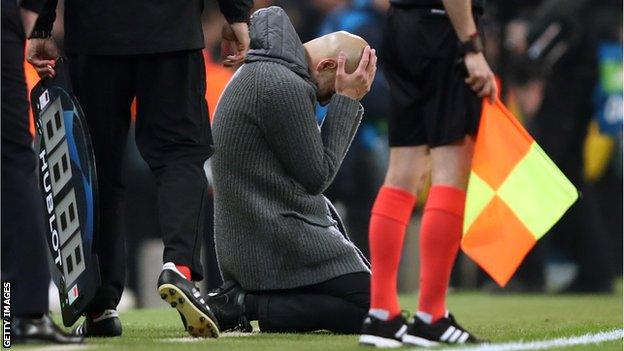
Pep Guardiola sank to his knees after Raheem Sterling's late goal against Spurs was disallowed by VAR
Normal service was restored. Amid a scene of chaos and desolation the intervention by the club chairman had added some much-needed context and balance.
Next day, it was recovery day. Ederson, who was coming from probably his worst game of the season for City, was particularly down, as were the rest of the players.
The two victories that followed in quick succession would change the mood. Firstly against Spurs in the league and then at United; wins in games where a draw would have been as big as a defeat, given the form of title rivals Liverpool.
The other key moment came earlier, on 29 January. After taking a first-minute lead, City lost 2-1 at Newcastle. It was their fourth defeat of the season.
The following day Liverpool had the chance to stretch their lead at the top to seven points. They were held to a 1-1 draw at home to Leicester, which left them five points clear.
After the Newcastle defeat Guardiola's side bounced back with three wins in eight days, at home to Arsenal and Chelsea and away to Everton. In fact, the points dropped at Newcastle were the last ones they would squander all season.
On 3 March Liverpool went to Everton two points behind City but with a game in hand desperate for a win to keep the pressure on. The game finished goalless and, with eight matches remaining, Liverpool were no longer masters of their own league destiny.
"Do you realise," Pep was told, "that everything that needs to be played from now is as much a final as the FA Cup is?" Guardiola's answer was interesting.
"In the Champions League we have some margin".
All the games played like a final were won since then. The only defeat? The first leg against Spurs in the Champions League.
The relationships crucial to Guardiola's success
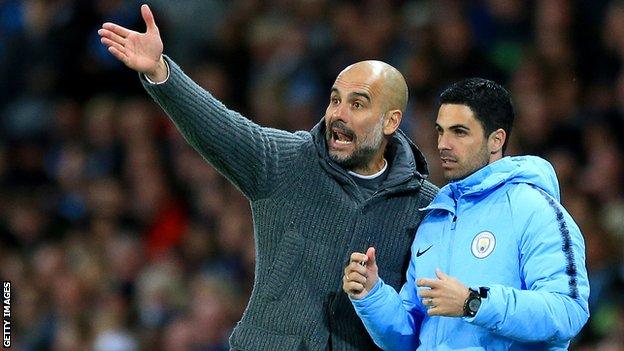
Mikel Arteta (right) has been a key part of City's season having nearly taken over from Arsene Wenger at Arsenal
Not much has changed from last season, when City amassed a record 100 points. As the saying has it, "If it ain't broke, don't fix it".
From day one in this pre-season, the manager was demanding. As demanding as ever. And not just in training but also in getting to know the players personally.
He feels the more you know about them, the more qualified you will be to answer key questions about them. Has so much success made some complacent? How do they react in defeat? Or in victory?
Guardiola still prepares for every game as if it was the last one and he has a squad that follows whatever direction he is asking them to take.
He is the group's leader but he gets his assistants to help him see things with a calmer head, to gain confidence when he is down, and to occasionally counsel the most interventionist of coaches that sometimes less is more and that actually changing nothing can the best course of action.
The connection between the players and the coaching staff is very strong and increased when Mikel Arteta took over as assistant manager after Domenec Torrent left for New York City FC.
At the start of the season Arteta came within a whisker of joining Arsenal when Arsene Wenger left the Gunners. He would have left with the blessing of Guardiola and the club but the fact he did not has been a vital factor in this season's campaign.
He was in charge when Guardiola received a touchline ban (where he changed his behaviour - he had been more active as an assistant than as the temporary manager) and has constantly been the man at Guardiola's side.
Guardiola feels challenged by his number two in a positive way because he gets another perspective, a different vision, from him.
The one-to-one work that took Sterling to new heights
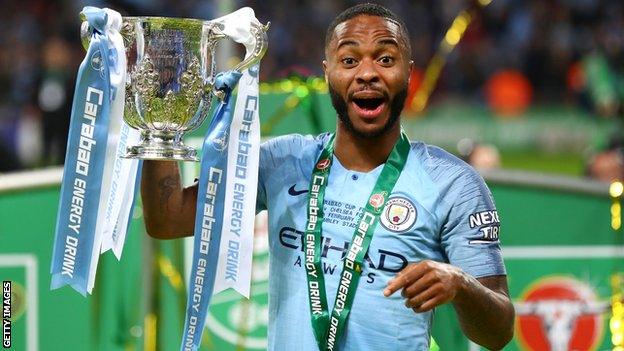
Raheem Sterling scored the winning penalty in the Carabao Cup final against Chelsea
One of the players to have taken a massive step forward this season is Sterling, who went from missing lots of chances last season to converting most of them this time around.
Those misses were the start of the job for Guardiola. He would tell the England forward: "Position yourself like this when you receive the ball, run at this time and not so early, look at this video and see that you went the wrong way… eventually the goals will come."
Then as part of training sessions he would take him aside to practise what he advised him to do. And they did this from the start of the campaign. His stats have doubled.
Guardiola organises everything so Sterling (and Sergio Aguero, Gabriel Jesus and Bernardo Silva) get to be on their own in front of the goalkeeper.
The work in training is of the highest quality and the players are happy to be pushed. A regular at those sessions tells me: "If you watched training you would say, 'wow, what a level!'. You would say, 'how is it possible that Phil Foden doesn't play? We have to find a way to get him involved more often.'"
Being surprised by Bernardo Silva
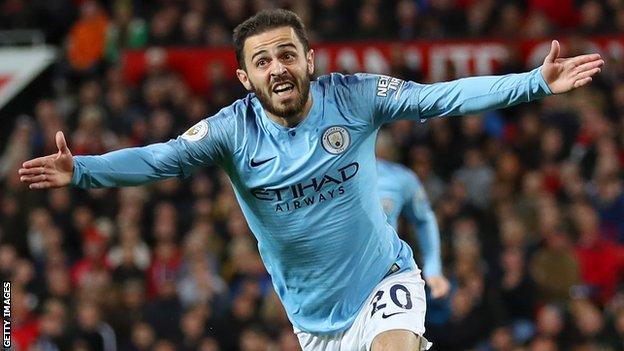
Bernardo Silva joined City from Monaco for £43m in May 2017
The absence, followed by the return, and then the absence again of Kevin de Bruyne could have been terminal for City's hopes this season.
Benjamin Mendy has also been out for most of the season and injuries to Fernandinho also affected performances. Claudio Bravo has been out all year, Fabian Delph for around four months and Vincent Kompany five months. Four of those would be starters in many games.
But injuries are an integral part of football and by and large City, with their vast finances, have had a strong squad to compensate for them.
Two players, though, raised their game unexpectedly, most importantly of all Bernardo Silva.
He has been City's wildcard for much of the campaign, playing just about anywhere. Capable of changing direction with the ball like few in football, he surprised Guardiola last summer.
He was the first World Cup player to arrive to training and went on tour with the side. He scored two goals and provided one assist in a team comprised mainly of kids against Bayern Munich, and that allowed Guardiola to see him in a new light.
He excelled when needed as a winger, as a link to the attack, as a midfielder on the right or left. He started performing as well or even better than the regulars in that position.
He runs more than anyone, is one of the best-loved players, always having to deal with difficult cheeky passes in training-ground "rondos" to make it difficult for him but always finding a solution. This season he has been the adhesive that has bound the side together.
Another player to emerge was Oleksandr Zinchenko, who was so keen to learn, who loves the game so much, feels so privileged to be among the elite that Guardiola accepted him staying and used him to the best advantage. He is not naturally a left-back but he is so made up about playing in this team that he has done everything and more to adapt.
And then there is Ilkay Gundogan, who became the equivalent of the crumpled fiver you find stuffed down the back of the sofa when you're skint.
Just as Fernandinho succumbed to injury, Gundogan stepped into the role like the proverbial duck to water.
So much so that Fernandinho could combine his usual role with the one of centre-back next season to allow Gundogan to continue playing in that key position.
What next for Guardiola?
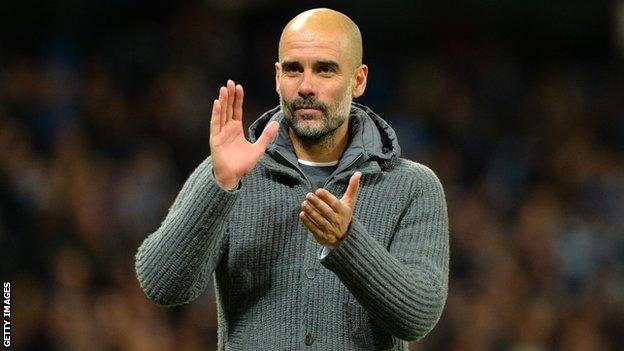
Guardiola's current deal runs until the end of the 2020-21 season
Despite the 'discovery' of Gundogan, City are still looking for a holding midfielder and they like the look of Bruno Fernandes (Sporting Lisbon) and Rodri (Atletico Madrid).
There will be one or two more signings, but who else joins will depend solely on who - if anyone - leaves.
Will players of the calibre of Gabriel Jesus (Brazil's number nine) or Leroy Sane continue to accept the secondary role they have had this season?
Last summer a top club offered 150m euros (£126m) for Bernardo Silva but neither the club nor the player wanted to part company. What will others do?
Guardiola has used every international break to give time back to his family, has been seen playing golf occasionally but not often, and has also been spotted at the theatre on a couple of occasions.
But these are the exceptions. It is a very tiring season, and the usual trip tends to be from the training ground to his flat in the centre of Manchester to rest - he needs all the energy he has to spread it around in the team.
He is probably more settled and happy now than he has been since his first seasons at Barcelona, where everything was balanced and everybody moved in the same direction. Like now.
He finds conflict hard to deal with and fortunately there has been nothing of that at City.
Astonishingly this is still a team which Guardiola believes can get even better. That is why he signed a contract extension that will keep him at Manchester City at least until the end of the 2020-21 season.
And when he feels he cannot make them any better, when he senses he has gone as far as he can with his team, he will walk away, just as he did at Barcelona and Bayern Munich.